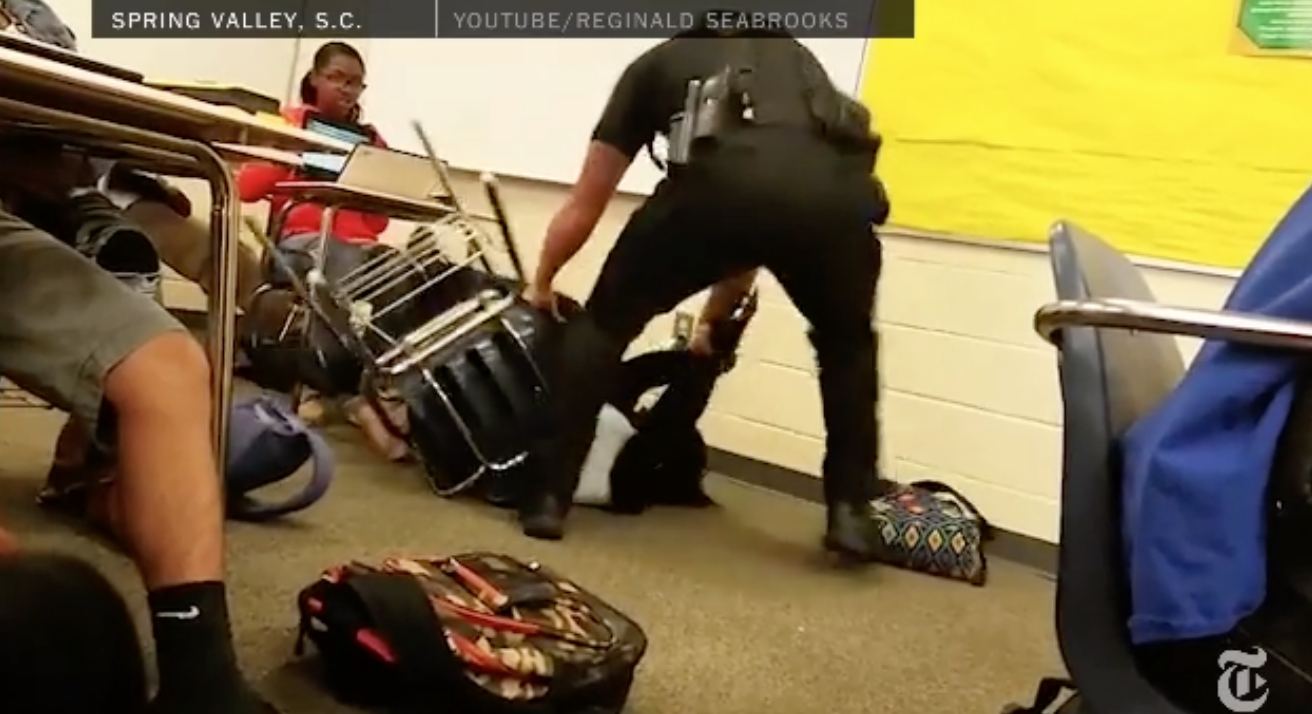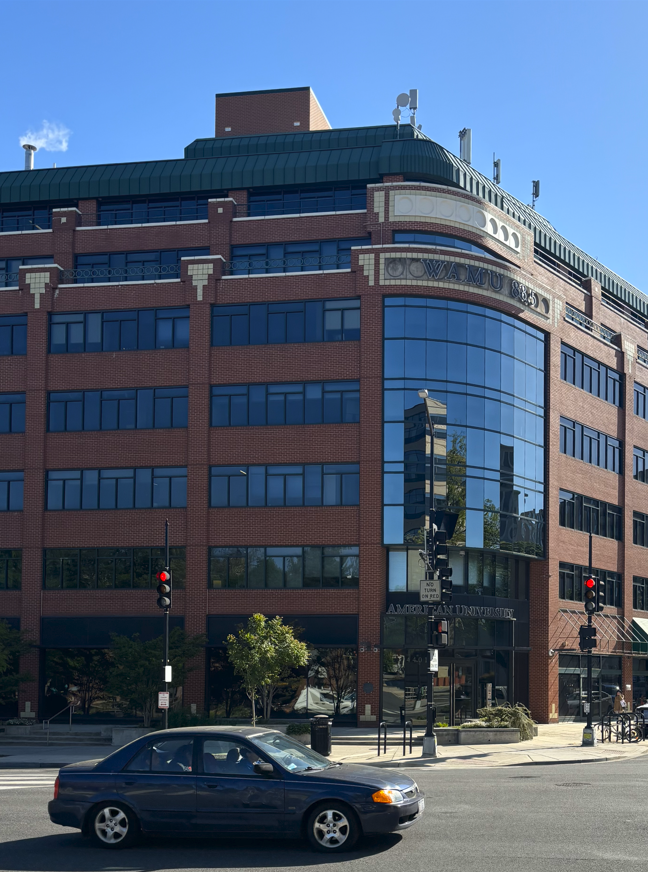Revealing the Carceral Society: Why an AU Professor Isn't Surprised by the Assault of the South Carolina Student
November 13, 2015
Two weeks ago a young black female student in a South Carolina high school was body-slammed and arrested by a white police officer for not obeying her teacher’s direction to get off of her cell phone. The official charge was “disrupting class.” Three students filmed the incident where Officer Fields throws the student to the ground and drags her across the floor. One of those documenting students, another young black woman, was also arrested for “disturbing class.” The response to the violent assault caused outrage across the nation.
Although Fields was fired as a result, online commenters rallied behind him for doing his job. Some claimed that the young student deserved what she got for being “an entitled brat.” Few analyzed her “entitled” behavior in light of the fact that she is recently in the foster care system.
I was perplexed in trying to understand how some could justify the officer’s brutality, especially once his supervisors explained that the maneuvers he used in cuffing the girl did not follow proper training or protocol. I wondered what led the school and the officer to that moment.
AU Associate Professor Marianne Noble has a unique answer. In her class The Value of Literature, Noble used the story of the young woman in South Carolina to flesh out the ideas of French literary critic and philosopher Michel Foucault, as voiced in his 1975 book Discipline and Punishment. Noble, who specializes in 19th century American literature, clarified for AWOL the connection she sees between the young student arrested for disruption, Foucault’s theories on discipline and punishment, and the various things that happen in “Bartleby the Scrivener,” a famous short story by Herman Melville.
AWOL: Foucault says we are not free; however, it is not direct authority that takes away our freedom. So what does?
Marianne Noble: It’s our own desire. It’s subjectivity. It’s all the institutions that are geared toward helping us be who we’re supposed to be–the educational apparatus, prisons, psychiatry, all these sort of institutions that are designed to help us ally ourselves with the norm.
Whereas in former eras there was a very visible, external form of power in the form of oppression like military or the police, Foucault argues that now that power is internal. We become the agents of our own oppression and subjugation. Willingly, we police ourselves.
And what are the consequences of not normalizing?
According to Foucault, the ultimate meaning of not normalizing is jail. Our society itself is carceral. But we don’t send everybody to jail. Instead, we send them to institutions—which study them and help them become normal.
So how is that carceral?
It’s because the norm is itself a carceral norm. It’s the standard of expectation. After your psychiatrist has cured you—perhaps prescribing Prozac or Xanax or Ritalin to help you buck up, calm down, or focus more—you will be more comfortable being normal. And so that’s carceral because somebody else is adjusting your life and your behaviors—though they do it in the name of love, not repression.
Here is an excerpt from “Bartleby the Scrivener,” in which the lawyer is shocked that Bartleby, his employee, would prefer not to work:
In this very attitude did I sit when I called to him, rapidly stating what it was I wanted him to do—namely, to examine a small paper with me. Imagine my surprise, nay, my consternation, when without moving from his privacy, Bartleby in a singularly mild, firm voice, replied, “I would prefer not to.”
I sat awhile in perfect silence, rallying my stunned faculties. Immediately it occurred to me that my ears had deceived me, or Bartleby had entirely misunderstood my meaning. I repeated my request in the clearest tone I could assume. But in quite as clear a one came the previous reply, “I would prefer not to.”
“Prefer not to,” echoed I, rising in high excitement, and crossing the room with a stride. “What do you mean? Are you moon-struck? I want you to help me compare this sheet here—take it,” and I thrust it towards him.
“I would prefer not to,” said he.
So how does Bartleby in Bartleby the Scrivener by Herman Melville reveal Foucault’s theories on our society?
Well I would say it shows Melville’s conviction that we are not free, and that’s where I would say that he most completely aligns with Foucault. All Bartleby does is say, “I would prefer not to.” He is asked to do incredibly boring, tedious tasks and he says, “I would prefer not to.” Our society basically tells us we are free to do whatever we want to do, and whenever we do things it’s because we want to do it, and if we don’t want to do it, we can just leave and not do it. Foucault and Louis Althusser and other Marxists say that is just ideology. Bartleby says, “I would prefer not to do these tedious tasks,” and the whole office machinery just stops.
And so what is the connection then, between the young student from South Carolina who was body slammed by a police officer and Bartleby?
She reminded me of Bartleby a lot because she didn’t do anything wrong. All she did was not put her cell phone away. Now keeping her cell phone out, there’s nothing harmful about that; there’s nothing illegal about that. It’s just against the rules of this institution. So she didn’t do anything—all she did was basically say I would prefer not to. And yet she revealed to all of us that in fact we’re not free to do as we wish. We are very confined by rules, and the other thing she revealed to us, and this is the really Foucauldian part, is the way that school is carceral. You must prefer to put your cell phone away if your teacher wants you to. If you do not prefer that, ultimately your fate is the law and jail. In fact, the South Carolina police officer’s assault on this student only revealed the truth underlying the calm of every day. Foucault might say that in the good old days, before our modern forms of disciplinary control, the police officer’s assault would have been a form of power that was sort of habitual. No one would have been outraged.
But now, in our modern era, each one of us has internalized that power, and so we rarely see it. It operates more through ideology than it does through actual visible repression. But subjects in our society are even more controlled and unfree than they were in the earlier times, and in fact they’re more so because they’re so completely committed to the norm. It’s the mind itself that’s controlled, so it’s a more insidious form of control, and we don’t see the signs of oppression as much anymore. When we do see them, then we are seeing the failure of society to work.
So what happens in the case in South Carolina is this police officer assaulted this student for simply not putting her cell phone away, and everybody is shocked and they think that what he is doing is evil, and so they demand he be fired.
But Foucault would say that his actions are actually at the logic of everything and he just made visible the carceral nature of school, the carceral nature of compliance, the carceral nature of exercising freedom. It’s not that it’s okay for police officers to assault people; the point is that his actions are a metaphor for our society in general, while by and large people think it isn’t. We think that by firing a police officer, we can go back to thinking our society is free and humane.
So can you also draw parallels between the student’s teacher and the lawyer in the story, according to Foucault?
In Bartleby the lawyer doesn’t want to report Bartleby to the police. He doesn’t think of himself as a repressive individual; he thinks of himself as a kind and humane man. But ultimately he cannot tolerate Bartleby’s claim to his freedom of preference. But rather than call the police, the lawyer changes offices, leaving Bartleby as a problem for the next tenants to solve. The police eventually take him to jail, and he dies in jail for nothing. For doing nothing at all.
There’s an interesting analogy between the lawyer and the teacher in the South Carolina case. She doesn’t think that what she’s doing is oppression. What she actually thinks is that she is helping her students. Foucault would say that in essence, what she is doing is helping people find pleasure and success in a carceral society. Her love and concern take the form of getting her students to be docile. According to Foucault, she’s just a tool of power. But like the lawyer, she doesn’t want to be that. So, she calls the principal. But the principal doesn’t want to be repressive either, so he calls the police. They get the police to do their dirty work, which allows them to retain their sense of themselves as benevolent people who promote the freedom of their students.
What has Officer Fields done to reveal this careful system of entrenched power?
There’s this kind of latent threat of violence [in society] that we never really think about because it’s all invisible. But he, for this moment, made it visible.
How are we to feel about her defiance of the norms of the classroom? What does her situation say about the institutions of society, given the late knowledge that she was recently in foster care?
I feel sorry for this young woman. She is in foster care, so every aspect of her life if is institutionalized. Institutionalized 24/7—well, Foucault would probably say, “this is all just training for jail.” Non-normative individuals basically get jail, or psychiatric prison.
I have no doubt that Foucault would cheer her action. It’s a simple action; it’s just saying, “I’m not going to do what you tell me to do. You don’t control me; you don’t control my mind.” She’s claiming a sense of self in opposition to all these institutions who are trying to mold her subjectivity. But I worry about her because there is no outside. This is the only society we have. There are possibilities for resisting subjectivity, as she has shown, and she clearly has a strong will. But from a statistical point of view, I don’t think she’s in good shape.
What about the young woman arrested for filming? What does that say about standing up for injustice in our society?
I think it’s insane. There’s absolutely no reason to arrest people for documenting injustice. But it does demonstrate that society doesn’t want its carceral nature to be publicized.
Do you think that nice police officers will solve the problem? If not, what might?
Foucault would not say that nice police officers would make any difference. In fact he would say that that’s basically what I am. You know—me, and the teacher, and the principal–we’re all nice police officers. So nice police officers would just make it all the more insidious because we’re strengthening the normative nature of our society. We’re getting more people to adapt themselves to a capitalist form of existence. Do I think that police officers should be nicer? Yes I do, particularly towards African Americans who are disproportionately victims of judicial abuse.
Marianne Noble is an Associate Professor in Dept. of Literature, 19th Century American Literature, Women’s Literature, Sex and Gender Studies.



